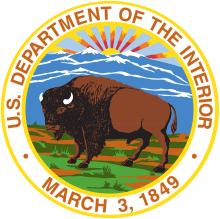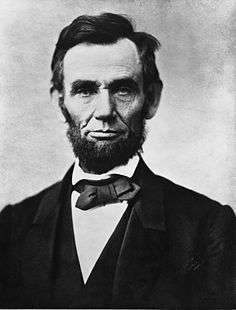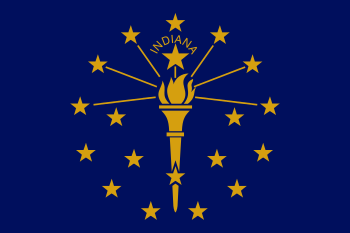Caleb Blood Smith
Caleb Blood Smith (April 16, 1808 – January 7, 1864) was a United States Representative from Indiana, the 6th United States Secretary of the Interior and a United States District Judge of the United States District Court for the District of Indiana.
Caleb Blood Smith | |
|---|---|
 | |
| Judge of the United States District Court for the District of Indiana | |
| In office December 22, 1862 – January 7, 1864 | |
| Appointed by | Abraham Lincoln |
| Preceded by | Elisha Mills Huntington |
| Succeeded by | Albert Smith White |
| 6th United States Secretary of the Interior | |
| In office March 5, 1861 – January 1, 1863 | |
| President | Abraham Lincoln |
| Preceded by | Jacob Thompson |
| Succeeded by | John Palmer Usher |
| Member of the U.S. House of Representatives from Indiana's 4th district | |
| In office March 4, 1843 – March 3, 1849 | |
| Preceded by | James H. Cravens |
| Succeeded by | George Washington Julian |
| Personal details | |
| Born | Caleb Blood Smith April 16, 1808 Boston, Massachusetts |
| Died | January 7, 1864 (aged 55) Indianapolis, Indiana |
| Resting place | Connersville City Cemetery Connersville, Indiana |
| Political party | Whig (before 1854) Republican (from 1854) |
| Education | University of Cincinnati Miami University |
| Signature | |
Education and career

Born on April 16, 1808, in Boston, Massachusetts,[1] Smith moved with his parents to Ohio in 1814.[2] He attended Miami University in Oxford, Ohio, from 1825 to 1826, Cincinnati College (now the University of Cincinnati) and read law in 1828.[1] He entered private practice in Connersville, Fayette County, Indiana, from 1828 to 1843.[1] He was founder and editor of the Indiana Sentinel in 1832.[2][1] He was a member of the Indiana House of Representatives from 1832 to 1837, and from 1840 to 1841, serving as Speaker in 1836.[2][1] He was Commissioner to collect assets and adjust debts for Indiana in 1837.[1]
Congressional service
Smith was an unsuccessful candidate for the 27th United States Congress in 1841.[2] He was elected as a Whig from Indiana's 4th congressional district to the United States House of Representatives of the 28th, 29th and 30th United States Congresses, serving from March 4, 1843, to March 3, 1849.[2] He was Chairman of the Committee on Territories for the 30th United States Congress.[2]
Later career
Smith was appointed by President Zachary Taylor to serve as a member of the board of commissioners to adjust claims against Mexico from 1849 to 1851.[2][1] He resumed private practice in Cincinnati, Ohio, from 1851 to 1859.[1] He was a member of the Peace Convention of 1861 held in Washington, D.C., in an effort to devise means to prevent the impending American Civil War.[2] He was appointed by President Abraham Lincoln to serve as the 6th United States Secretary of the Interior from March 5, 1861, to January 1, 1863.[2][1] However, Smith had little interest in the job and, with declining health, delegated most of his responsibilities to Assistant Secretary of the Interior John Palmer Usher.[3] When Lincoln showed the draft of the Emancipation Proclamation to his cabinet, the conservative Smith considered resignation upon its public announcement, but accepted the decision in the end.[3]
Federal judicial service
Smith was nominated by President Abraham Lincoln on December 16, 1862, to a seat on the United States District Court for the District of Indiana vacated by Judge Elisha Mills Huntington.[1] He was confirmed by the United States Senate on December 22, 1862, and received his commission the same day.[1] His service terminated on January 7, 1864, due to his death in Indianapolis, Marion County, Indiana.[1] He was interred in Connersville City Cemetery.[2]
Freemason
Smith became a Freemason in Warren Lodge No. 15 at Connersville in 1829. He would go on to serve as Grand Master of the Grand Lodge of Indiana in 1837.[4] Today, the highest award presented by the Grand Lodge of Indiana is the Caleb B. Smith Medal of Honor.[5]
References
- "Smith, Caleb Blood". Federal Judicial Center.
- United States Congress. "Caleb Blood Smith (id: S000519)". Biographical Directory of the United States Congress.
- Mr. Lincoln's White House: Caleb Blood Smith
- Smith, Dwight L. (1968). Goodly Heritage: One Hundred Fifty Years of Craft Freemasonry in Indiana. Franklin, Indiana.
- The Cincinnati Historical Society Bulletin, Vol. 30. 1972. pp. 47.
Sources
- United States Congress. "Caleb Blood Smith (id: S000519)". Biographical Directory of the United States Congress.
- "Caleb Blood Smith". Find a Grave. Retrieved 2009-03-26.
- "Caleb B. Smith Papers, 1849-1862, Collection Guide" (PDF). Indiana Historical Society. 2004-11-01. Retrieved 2012-11-02.
- The Department of Everything Else: Highlights of Interior History (1989)
- "Weird Mystery" a story about Caleb Blood Smith, can be found at http://www.libraries.iub.edu by typing in the search bar. This is a story written by John Walker and co-written by Cynthia Long, John Walker's granddaughter.
- . Appletons' Cyclopædia of American Biography. 1900.
- Sanford, Wayne L. "Cemeteries" The Encyclopedia of Indianapolis. Bloomington: Indiana University Press, 1994. googlebooks Retrieved May 21, 2009
| U.S. House of Representatives | ||
|---|---|---|
| Preceded by James H. Cravens |
Member of the U.S. House of Representatives from Indiana's 4th congressional district 1843–1849 |
Succeeded by George Washington Julian |
| Political offices | ||
| Preceded by Jacob Thompson |
U.S. Secretary of the Interior Served under: Abraham Lincoln 1861–1863 |
Succeeded by John Palmer Usher |
| Legal offices | ||
| Preceded by Elisha Mills Huntington |
Judge of the United States District Court for the District of Indiana 1862–1864 |
Succeeded by Albert Smith White |



